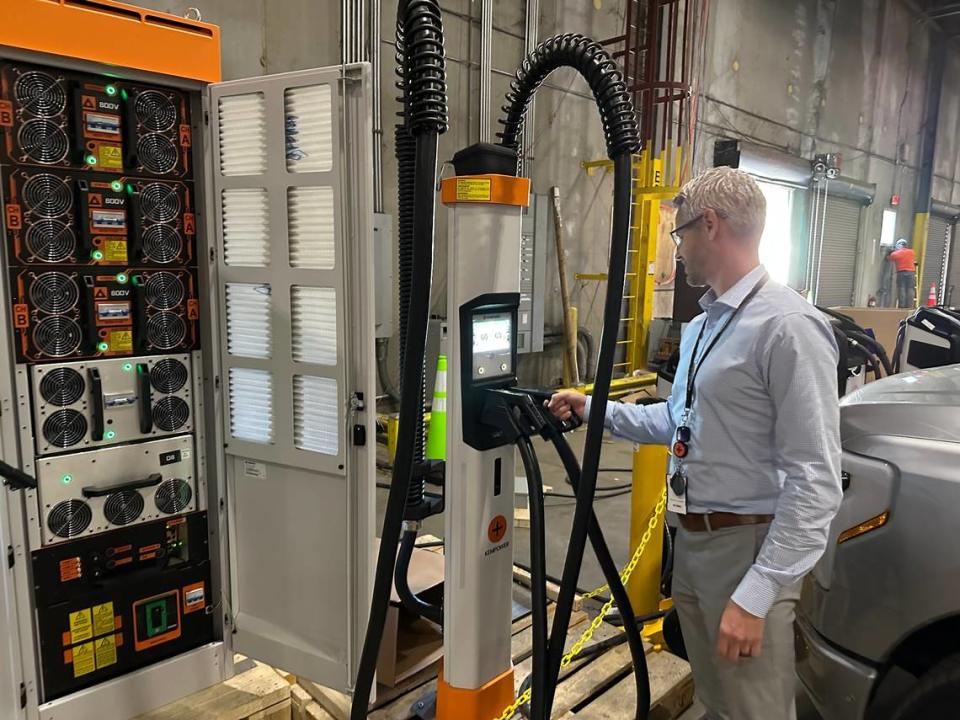Made in Durham, NC: European company ships first EV charger from its new US factory
They posed for a group photo with the 7-foot-tall metal cabinet wrapped in plastic, then watched anxiously as it was lifted by forklift and loaded into a box truck.
Employees at Kempower this week shipped their first electric vehicle charging system made in the company’s new factory in Durham. The cabinet, containing modules capable of providing 600 kw of electricity, was sent along with three chargers, each with two nozzles, to a customer in Edmonton, Canada.
Kempower is a Finnish company that chose Durham for its base in North America at a time when governments and the private sector are scrambling to create networks of chargers for the growing number of electric vehicles. About 75,000 fully electric and plug-in hybrid vehicles were registered in North Carolina this fall, five times as many as in 2018, and manufacturers are coming out with new EV models every year.
Kempower produced its first EV chargers in Finland in 2018 and now makes more than 10,000 a year there. It hopes to eventually make that many in Durham for the North American market.
The company’s ambitions are evident in the space it has leased off Alston Avenue — about 154,000 square feet over three buildings, including a cavernous manufacturing building that has so far produced just three charging systems.
“The idea was that this space enables us to grow in the years to come,” said Timo Eronen, operations manager. “Within six months, we’ve been able to get the production up and running, and now we’re in the ramp-up phase. That means we need to have some space for future growth.”
Kempower makes a variation on the traditional EV charger that it hopes will help drive sales. Instead of a gas-pump-sized box with nozzles on either side, the company’s chargers are about a foot wide and can be placed up to 260 feet away from the power unit — that big cabinet that takes power from the grid and distributes it to the chargers.
The company refers to its chargers as satellites.
“If you go with our system, you can have that box somewhere far away; it doesn’t take any space from the parking area,” said Marcus Suvanto, who heads up the Durham operation. “You have a satellite with two cables. Another satellite with two cables. You don’t necessarily need to change your parking lot design in any way.”
Each power unit can produce 50 kw to 600 kw of electricity and serve up to eight charging cables and include software that allows Kempower to monitor their performance from Durham. Suvanto declined to say how much the machines cost, saying it varies by the amount of power and satellites.
“But we’re talking hundreds of thousands if you want to have a reasonable amount of power,” he said.
Kempower received incentives from the state
To help lure Kempower to North Carolina, the state provided a job development grant worth up to $3 million spread over 12 years. To receive the full amount, the company must hit certain hiring and investment targets, eventually reaching more than 300 employees.
The company has hired about 90 workers so far, on its way toward 100 by year’s end, said spokeswoman Miracle King-Wilson.
Kempower’s charging systems can be adapted for use by companies with electric vehicle fleets or by retail customers who pay for a charge. The company hopes to benefit from the National Electric Vehicle Infrastructure or NEVI program, created by Congress to provide money to states to place EV chargers in places the private sector hasn’t yet. The program aims to help ease concerns people have about running out of juice on long trips.
The N.C. Department of Transportation received $109 million under NEVI and will seek proposals for spending it early next year.
Congress requires that charging systems placed by NEVI include materials made in the United States. While Kempower has found a U.S. company to make its metal cabinets, most of the components of its systems are still coming from Europe, Eronen said.
By next summer, the company expects that more than half of the value of its systems will be made in the U.S.
“Our target is to localize as much as possible,” Eronen said. “That also comes from the NEVI requirements which are driving towards the localization of the whole value chain in this business.”


